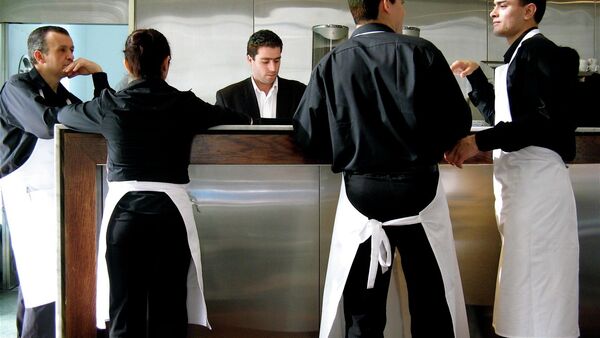Writing for The Telegraph, Nigel Farage said: "We are a party that believes Britain can and does benefit from skilled workers. From doctors to engineers, business people, investors, craftsmen. From people who will come here, fit in, work hard, and create jobs and growth.
Share if like #UKIP, you believe that Britain needs an Australian style points system #immigration pic.twitter.com/tdONcamiz8
— Nigel Farage (@Nigel_Farage) March 4, 2015
"UKIP wants to ensure that highly skilled people from the Commonwealth — from India, Canada, New Zealand, and beyond — get a fair chance to get into Britain, unlike now, where we give precedence, via our open border with the European Union, to half a billion people from Europe and its former Communists countries".
Farage is proposing a points system, like Australia where you're awarded points according to your value to the British economy. Alan Murad, from Eurosceptic campaign group Get Britain Out supports Farage's immigration reforms.
"The Australian-style points system is one of many options to reform immigration. It is completely unfair to grant special preference to European migrants and discriminate against non-Europeans, particularly as we live in a globalised world," Murad said.
"Why must we uniquely give privilege to Europeans over skilled migrants from the Commonwealth and around the globe? We must not judge potential migrants based on their country of origin, but instead look at what skills they can contribute to this country".
Get Britain Out — are calling for exactly that — for the UK to leave the European Union. According to Nigel Farage, "77 percent of the British public wants us to take back border controls".
EU immigration can be divided into two groups: those from accession countries that joined after 2004: Czech Republic, Estonia, Hungary, Latvia, Lithuania, Poland, Cyprus, Malta, Slovakia and Slovenia; and old EU countries; Luxembourg, Belgium, Ireland, Germany, France, Sweden, Spain, Greece, Portugal, Italy, Sweden, Finland, Denmark, the Netherlands, the UK and Iceland.
The European Union Needs us Far More Than We Need Them — Breitbart http://t.co/zpG3GSeg3I pic.twitter.com/AVmhdXjPzZ
— Breitbart London (@BreitbartLondon) February 21, 2015
In 2007, Romania and Bulgaria joined the EU — but their right to work and claim social and medical services in member states were restricted for seven years. This changed on January 1, 2014 when the restrictions were lifted and EU immigration became a major political issue in Britain.
Since 2009 and the collapse of the Eurozone, Britain has become a destination for many ‘old EU' migrants from Spain and Greece. Data from the Labour Force Survey suggests that there are around 2.8 million people from various European Union countries living in Britain.
Five percent are from 'accession countries', Bulgaria and Romania. According to the Office for National Statistics, there are 94,000 people from Romania and 47,000 from Bulgaria living in the UK.
Of the 2.8 million EU migrants living in Britain, 131,000 are claiming benefits, according to data from National Insurance Number registrations.
Prime Minister David Cameron is under pressure to be seen as taking a strong stance on immigration, to keep up with the rhetoric from Nigel Farage, UK Independence Party leader, who promises to "retake control of Britain's borders".
30,000 British claiming benefits in Europe — Cameron & Farage should stop blaming migrants in the UK http://t.co/bK3jTDdKDS
— ChineseforLabour (@Chinese4Labour) January 22, 2015
David Cameron has promised an in-out referendum on Britain's membership in 2017 if the Conservative Party wins in May.
Meanwhile German Chancellor Angela Merkel has made it clear that the principle of freedom of movement among member states in the European Union is not negotiable.




